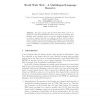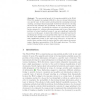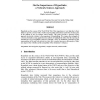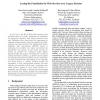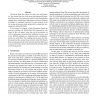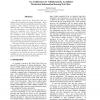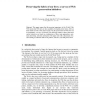WEBI
2001
Springer
14 years 3 months ago
2001
Springer
Abstract. This paper argues that the World Wide Web could be regarded not only as an information resource but also as a dynamic, multilingual, least controlled, easy to access and ...
AIIA
2001
Springer
14 years 4 months ago
2001
Springer
The exponential growth of documents available in the World Wide Web makes it increasingly difficult to discover relevant information on a specific topic. In this context, growing ...
ENTER
2009
Springer
14 years 4 months ago
2009
Springer
Hyperlinks are the essence of the World Wide Web. Their importance is very high due to their ability to provide a visitor with a wealth of good quality information and for the rol...
WSE
2002
IEEE
14 years 4 months ago
2002
IEEE
As the use of the World Wide Web becomes more pervasive within our society, businesses and institutions are required to migrate a wide range of services to the web. Difficulties a...
VISSOFT
2002
IEEE
14 years 4 months ago
2002
IEEE
For users who peruse the World Wide Web to locate potentially useful security-related tools, the typical information contained in most sites - a pointer to the tool and, optionall...
HICSS
2002
IEEE
14 years 4 months ago
2002
IEEE
Digitization of information, the rise of the World Wide Web, and the development of new means for information creation, production and dissemination place new strains on the legal...
DEXAW
2002
IEEE
14 years 4 months ago
2002
IEEE
The World Wide Web, due to its sheer size and dynamics, has turned into one of the most fascinating and important data sources for large-scale analysis and investigation, ranging ...
DEXAW
2002
IEEE
14 years 4 months ago
2002
IEEE
As originally conceived, the World Wide Web was intended for the purpose of sharing information. Many websites realise this aim by publishing pages from a data repository which su...
IICS
2003
Springer
14 years 4 months ago
2003
Springer
As XML has become an emerging standard for information exchange on the World Wide Web, it has gained attention in database communities to extract information from XML sees as a dat...
ERCIMDL
2003
Springer
14 years 4 months ago
2003
Springer
This paper argues that the growing importance of the World Wide Web means that Web sites are key candidates for digital preservation. After an brief outline of some of the main rea...
